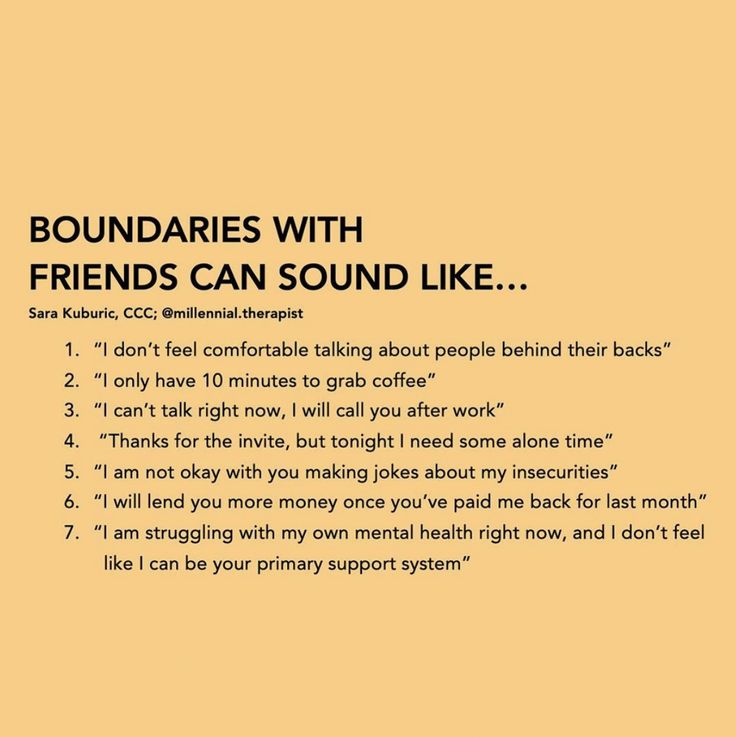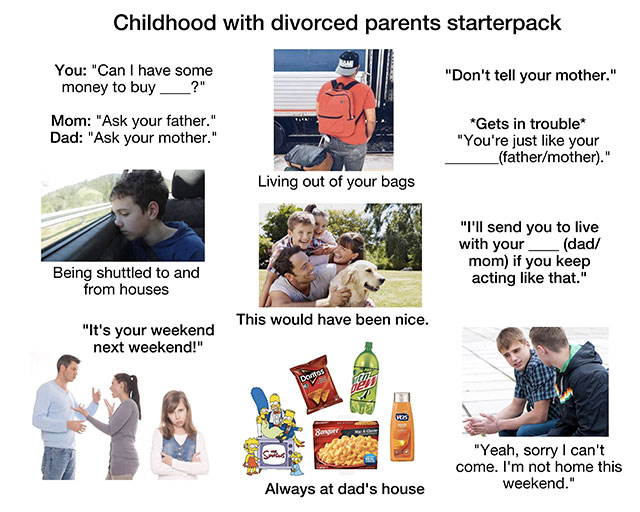Physical boundaries in relationships
Setting Boundaries in Your Relationships
Let’s Talk About Boundaries
As the leaves begin to change colors and fall from the trees and the air turns crisp and cool, it becomes apparent that spooky season is upon us. However, there may be something even scarier than horror movies, haunted houses, and Halloween decor: setting boundaries.
What are Boundaries?
As Henry Cloud asserts, “boundaries define us. They define what is me and what is not me. A boundary shows me where I end and someone else begins, leading me to a sense of ownership. Knowing what I am to own and take responsibility for gives me freedom.” Boundaries are standards we set in our relationships that let others know what behavior we find acceptable and what behavior we will not tolerate. By setting boundaries, we teach people how to treat us, and we honor that we are only responsible for our own feelings and behaviors – not the feelings and behaviors of others.
What Types of Boundaries are There?
There are a plethora of types of boundaries including physical, emotional, sexual, material, and time boundaries. Physical boundaries encompass touch, your personal space, and your physical needs. For example, you can create limits about how or when you are touched as well as who you are comfortable touching you. You are also able to determine who is allowed into your personal space or home. In addition, you are in control of when you need to eat or sleep or otherwise meet your physiological needs.
Emotional Boundaries
Emotional boundaries are how you recognize and honor your feelings as well as how much energy you are able to provide in relationships at any given time. You are able to decide when you share feelings or certain information about yourself as well as when you are available to listen to others who want to share their feelings with you.
Sexual Boundaries
Sexual boundaries revolve around consent and respecting someone’s sexual preferences or expression. Material boundaries are boundaries you set around your personal items and what you are okay lending to others.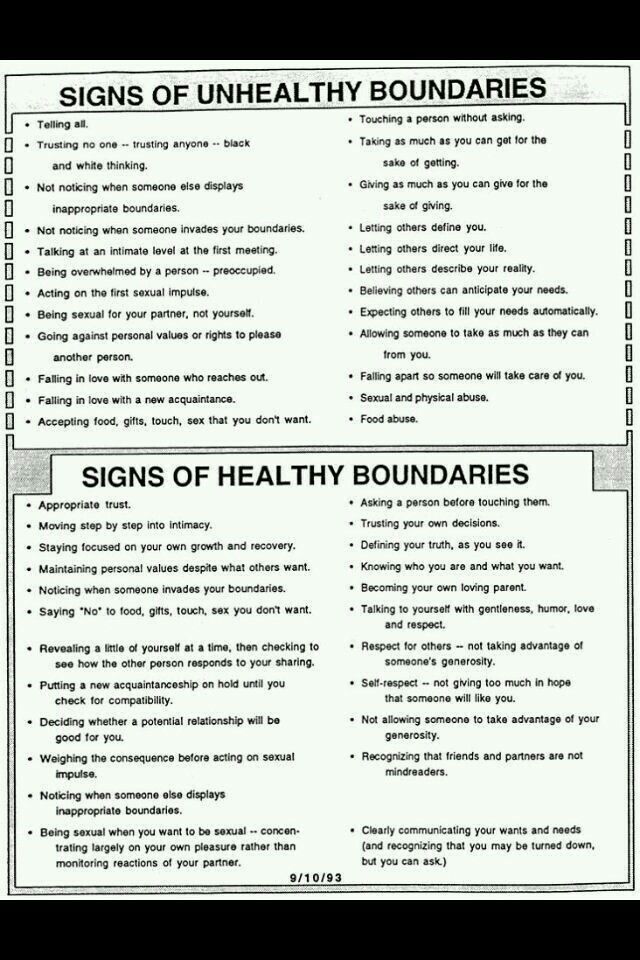 Lastly, boundaries that have to do with time allow you to prioritize your needs and set aside time for what is important to you without overcommitting. This may look like scheduling time for yourself to engage in a hobby or self-care and making sure that work or other obligations don’t interfere.
Lastly, boundaries that have to do with time allow you to prioritize your needs and set aside time for what is important to you without overcommitting. This may look like scheduling time for yourself to engage in a hobby or self-care and making sure that work or other obligations don’t interfere.
How Do You Set Boundaries?
Boundaries are not always easy to communicate or enforce, however. Setting boundaries at work or in our personal relationships with friends and family can be incredibly challenging. The first step is to identify what you would like your boundary to be. Is your boundary flexible or rigid? Does your boundary change depending on the person or situation?
Imagine yourself as a house and your boundaries as keeping the house protected and secure. With some people in some situations, you may feel most protected by having a fence or a security system whereas, with other people in other situations, you may leave a key under the mat that grants them access to the front door. Boundaries are incredibly personal, and they can be changed or adjusted as needed.
Boundaries are incredibly personal, and they can be changed or adjusted as needed.
Try this Acronym: DEARMAN
Once you have identified your boundary and what action you will take if it is not respected, you can then communicate those boundaries to others. Sometimes people unintentionally cross our boundaries – not because they want to harm us but because they don’t know what our boundaries are. It is up to us to express our needs and boundaries. Using the Dialectical Behavior Therapy skill DEARMAN is a good place to start. The “DEAR” describes what we do when setting a boundary, and the “MAN” piece describes how we set the boundary. The acronym is as follows:
D – describe the facts of the situation
E – express your feelings about the situation using “I” statements
A – assert your needs or ask directly for what you want
R – reinforce why the person should respect your boundary or need; this can be as simple as a thank you
M – stay mindful; keep focused on your goal
A – appear confident by standing up straight, make eye contact, and speak up
N – negotiate; this can look like providing space for the other person to express their needs as well
What if People Don’t Respect My Boundaries?
Of course, just because you set boundaries doesn’t mean that others will always respect them.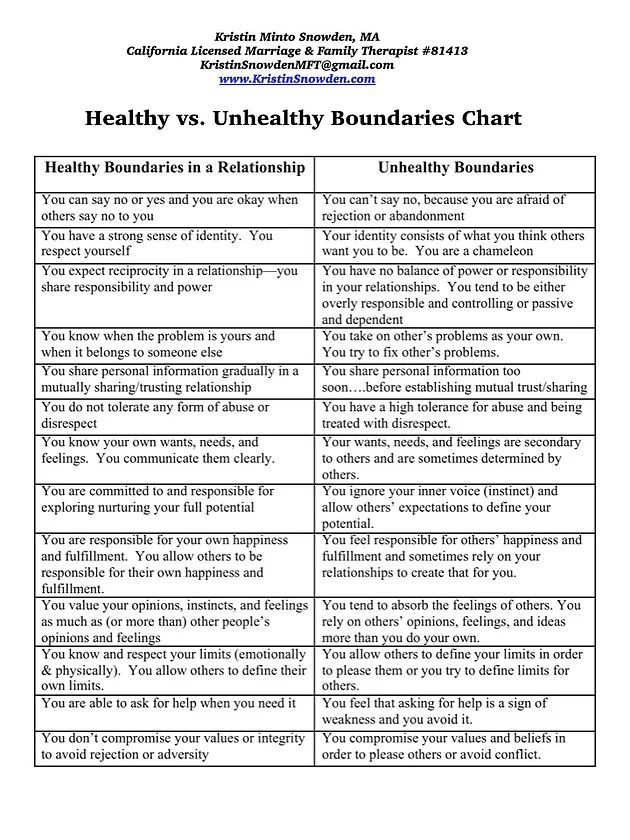 For example, people may engage in boundary-crossing behavior. When others cross our boundaries, we may experience feelings of resentment, anger, disappointment, or even violation. It is also possible that we may feel invalidated and disrespected, which can lead to feelings of shame. If you notice yourself justifying someone else’s poor behavior or even feeling like you have lost your power to choose or make decisions for yourself, it may be important to reexamine what your boundaries look like and how to uphold them.
For example, people may engage in boundary-crossing behavior. When others cross our boundaries, we may experience feelings of resentment, anger, disappointment, or even violation. It is also possible that we may feel invalidated and disrespected, which can lead to feelings of shame. If you notice yourself justifying someone else’s poor behavior or even feeling like you have lost your power to choose or make decisions for yourself, it may be important to reexamine what your boundaries look like and how to uphold them.
Boundaries are Not a Way of Controlling People
We must remember that boundaries are not a way of controlling people or their responses to us; instead, boundaries are a way of determining how we will respond. If someone has crossed a boundary, you can remind them of your boundary. If they continue to disrespect it, you are allowed to remove yourself from the situation or even distance yourself from the relationship. This might look like saying, “If you continue to yell at me or call me names, I am going to hang up the phone. I will only discuss this with you if you are willing to respect my boundaries.”
I will only discuss this with you if you are willing to respect my boundaries.”
Time to Examine the Relationship?
If an individual in your life consistently and repeatedly crosses boundaries and doesn’t change their behavior, it may be worthwhile to examine the relationship and if it is a beneficial addition to your life and mental wellbeing. Remember, just because someone doesn’t like your “no,” it doesn’t mean that you should’ve said “yes.”
Looking for some help discussing and setting boundaries? Schedule an appointment with one of our therapists today. Call 855-771-0404 or Connect with us here.
CONNECT
855-771-0404
[email protected]
Physical boundaries - love is respect
Teen Dating Violence Awareness Month
We’re excited to announce the 2023 theme for TDVAM is “Be About It”, selected by the love is respect Youth Council. Join us as we magnify the voices of young people and highlight teen issues related to healthy relationships.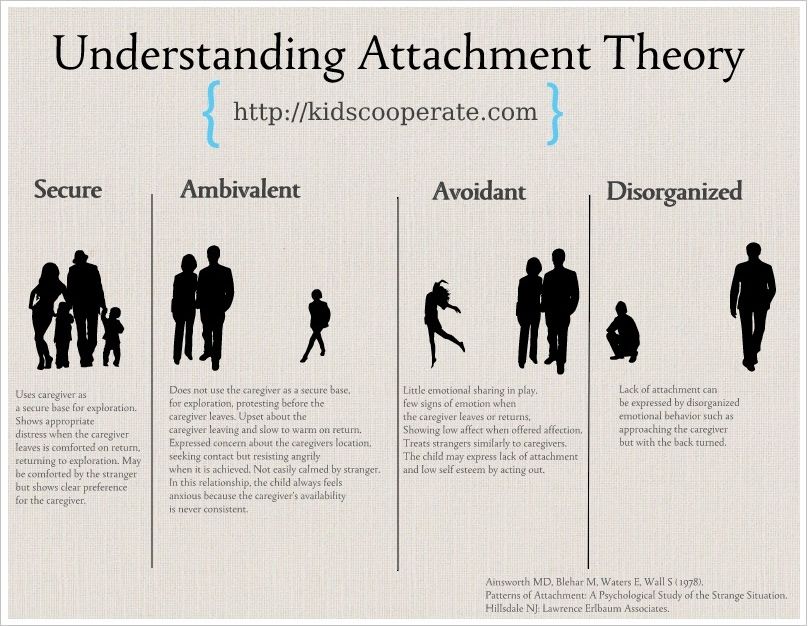
Join us!
love is respect
Search Close
Leave this site safely
You can quickly leave this website by clicking the “X” in the top right or by pressing the Escape key twice.
To browse this site safely, be sure to regularly clear your browser history.
Got it
Heads up!
Your browser history can be monitored without your knowledge and it can never be wiped completely. Think your internet use might be monitored? Call us at 1.866.331.9474.
Learn more about staying safe online and remember to clear your history after visiting this website.
You can quickly leave this website at any time by clicking the “X” in the top right or by pressing the Escape key twice.
OK
Respect for physical boundaries can be a good indication of how healthy your relationship is.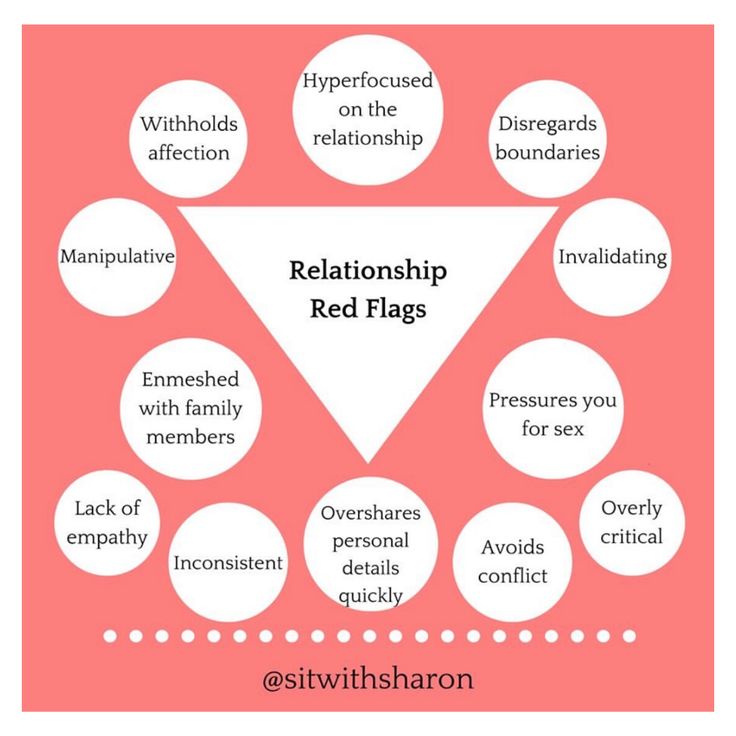 In a healthy relationship, partners know how far the other wants to go based on open communication, and they feel comfortable communicating with each other if something changes. There are no rules dictating how far you have to go by a certain age or at any given time in a relationship, and your boundaries should always reflect how ready you feel personally.
In a healthy relationship, partners know how far the other wants to go based on open communication, and they feel comfortable communicating with each other if something changes. There are no rules dictating how far you have to go by a certain age or at any given time in a relationship, and your boundaries should always reflect how ready you feel personally.
Remember: sex isn’t currency. You don’t owe your partner anything, and it isn’t fair for them to claim that you don’t care about them because you’ve established or are establishing physical boundaries. Building and respecting physical boundaries depends on open, honest communication.
If you’re trying to find the right way to discuss your boundaries, consider these tips for healthier communication (while keeping in mind any potential risks to your physical safety):
- Find the right time.
-
If something in your relationship is bothering you and you’d like to discuss it, it will help to do so at the right time.
 Try to find time and space when you and your partner(s) are calm and undistracted, without other stresses or time constraints. If you’re having trouble finding time to talk, consider scheduling a moment ahead of time.
Try to find time and space when you and your partner(s) are calm and undistracted, without other stresses or time constraints. If you’re having trouble finding time to talk, consider scheduling a moment ahead of time. - Talk face to face.
-
Avoid discussing serious issues about your relationship in writing. Texts, letters, and emails have the potential for misinterpretation, and talking in person will allow you to prevent unnecessary miscommunications. If you’re having trouble collecting your thoughts, write them down ahead of time — just be sure to read them out loud to your partner directly.
- Don’t attack each other.
-
Even when we mean well, our language can sometimes come across as harsh because of implications from words or intonation. Using “you” statements to center your anger may make your partner defensive and less receptive.
 Instead, try to use statements that center your relationship together. For example, instead of saying, “You’ve been distant with me,” consider framing the situation as, “It feels like we haven’t been as close lately.”
Instead, try to use statements that center your relationship together. For example, instead of saying, “You’ve been distant with me,” consider framing the situation as, “It feels like we haven’t been as close lately.” - Be honest.
-
Agree to be honest with one another. The truth can hurt sometimes, but it’s essential to a healthy relationship. Admit that neither of you can be perfect and apologize when you make a mistake rather than making excuses. Holding yourself accountable will ultimately make you feel better and help strengthen your relationship.
- Check your body language.
-
Let your partner know that you’re listening by giving them your full attention. Sit up, face them directly, and make eye contact when communicating. Don’t try to have a conversation while you’re doing something else like taking a phone call, sending a text, or playing a video game.
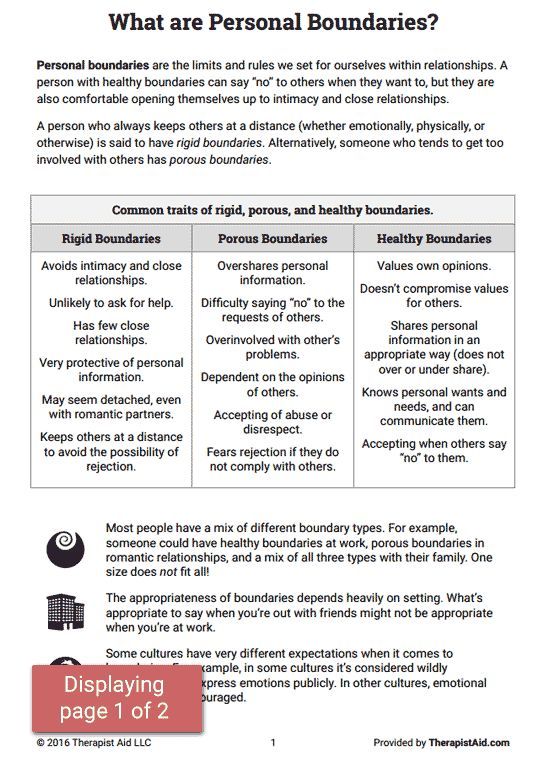 Show your partner you respect them by listening actively and responding to what they say.
Show your partner you respect them by listening actively and responding to what they say. - Use the 48 hour rule.
-
If your partner’s behavior makes you upset or angry, you need to let them know about it, but you don’t have to do so right away. Wait 48 hours to process your feelings, and if you still feel upset, say something. If not, consider what it was that made you upset in the moment and whether it’s an issue still worth raising.
Remember that your partner can’t read your mind: if you don’t speak up when you’re upset, there’s no way for them to assume responsibility or change. If you do mention your hurt feelings and your partner sincerely apologizes, forgive them and let it go. Don’t bring up past issues if they’re not relevant.
It’s okay to get angry in a relationship — everyone does at some point. What’s important is that you resolve conflicts in a healthy way. If you get angry with your partner, there are steps you can take to ensure you’re still communicating constructively.
If you get angry with your partner, there are steps you can take to ensure you’re still communicating constructively.
Stop.
If you’re really angry about something, stop, take a step back, and breathe. Tell your partner (respectfully) that you’d like to take a short break before continuing the conversation to calm down. Give yourself time by talking to a friend, taking a walk, watching TV, listening to music, or doing an activity that relaxes you. This can help prevent a tense situation from getting worse.
Think.
Once you’ve calmed down, consider the situation and what made you so angry. Was it your partner’s behavior, something they said, or how they spoke? Figure out the real problem behind your anger and consider how to express to them why you feel the way you do.
Talk.
Once you’re prepared to have the conversation, talk to your partner following the tips mentioned above.
Listen.
After you tell your partner how you feel, remember to give them space to express themselves and listen to what they have to say.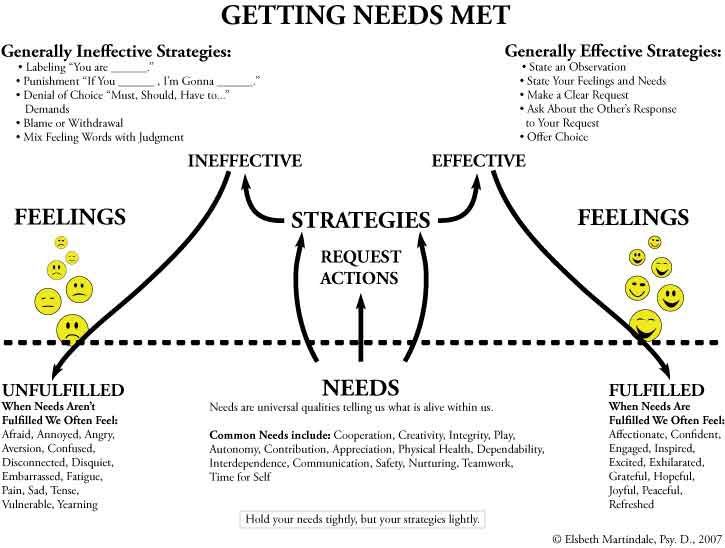 You both deserve the opportunity to communicate your feelings in a safe and healthy environment.
You both deserve the opportunity to communicate your feelings in a safe and healthy environment.
Answers shouldn’t be hard to find.
We're here to help!
- Call 1.866.331.9474
- Chat live now
- Text: LOVEIS to 22522
Personal and shared boundaries in relationships: why they are violated and how to protect them
Most of us in relationships are faced with the fact that our boundaries are different from the boundaries of another, and this leads to tension and conflict. For example, if someone came to visit us and began to look into all the rooms, touch personal belongings ... Or if we ourselves demand a full account from the partner, where and with whom he spent the day, this may indicate a problem with the awareness of boundaries .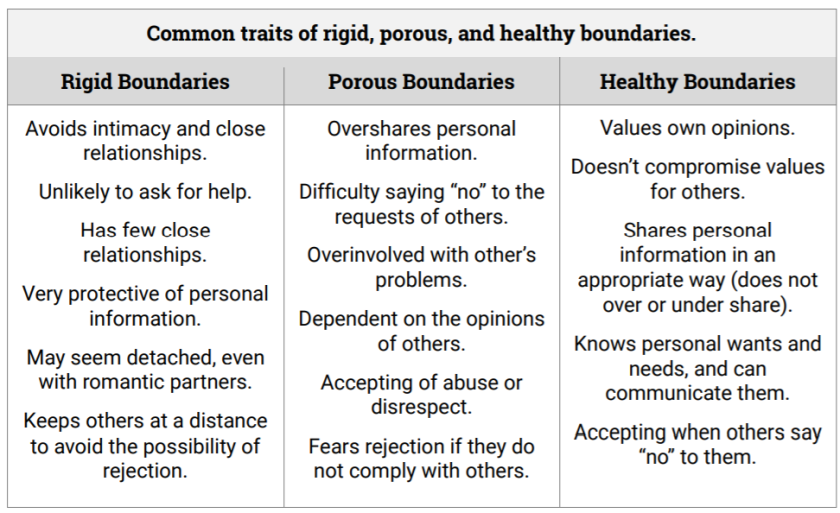
Another problem is that we consider other people, objects or spaces to be part of our personal territory. For example, from the victim in an accident you can hear: “My wing was scratched” - by this, of course, he will mean the wing of the car. Or a woman may feel that it is she who should decide for her 30-year-old son where he works and who he meets. nine0003
Often such a problem arises in marriage, when one partner begins to consider the other part of his territory and dictate his own rules.
Shared Boundaries
When we are in partnership, we have shared boundaries, such as the boundaries of a couple or an organization. The territory within these borders is no longer only ours - it is common, while inside it there are personal borders of each of us.
In a common area, it is important to take into account the boundaries and needs of everyone - the internal climate depends on this. No less important is the external climate - it depends on how much all participants cherish the boundaries of the common.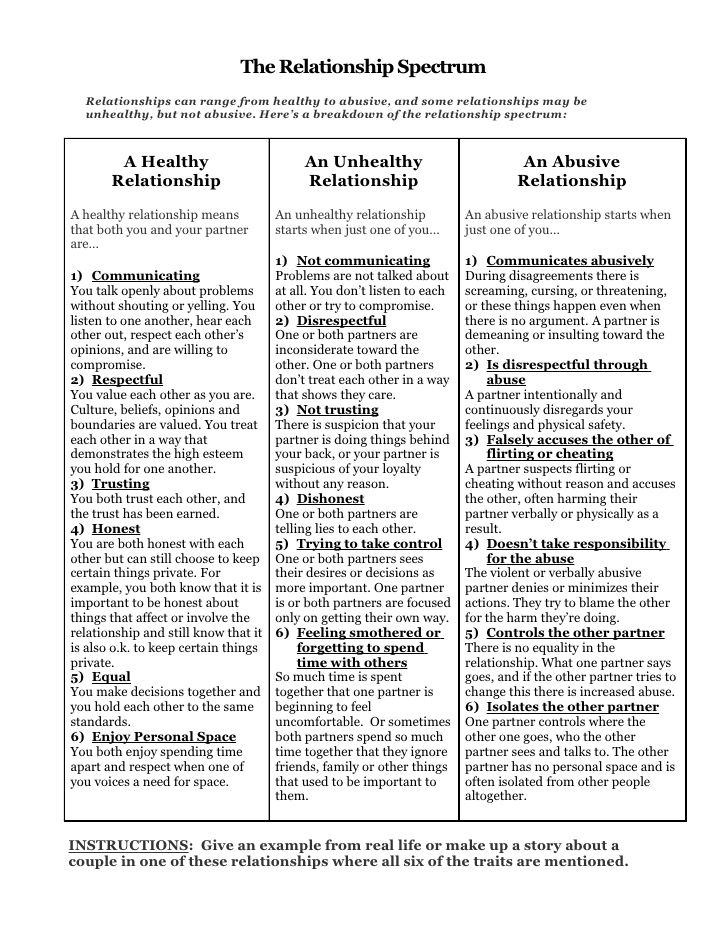 nine0003
nine0003
How can common boundaries be violated or destroyed?
- Send personal information about one of the partners or relations with him to the external field without consent. For example, share with your mother or girlfriend the details of your relationship with your husband.
- Invite someone to the common area without the consent of the other participants.
- Use the shared resources for your own purposes or at your own discretion without discussion with other participants.
- Make independent decisions about general matters. For example, to exclude a partner from making decisions about a child. nine0018
What to do if you violate another person's boundaries
First of all, be aware of where and how you allow your personal boundaries to be violated - perhaps because of this you feel entitled to do the same with other people. Start to notice how and where you violate the boundaries of someone else's space. You can notice this by the distance from others around you, their tension and irritation. If you notice a negative reaction, ask clarifying questions: “Do I understand correctly that you are uncomfortable talking about this, or did it seem to me?” nine0003
If you notice a negative reaction, ask clarifying questions: “Do I understand correctly that you are uncomfortable talking about this, or did it seem to me?” nine0003
If you have already violated the boundaries and the person has moved away from you or there is a conflict, stop the offensive and take a few steps back, switch your attention to your interests and return to the question when it is appropriate and the emotions subside.
What to do when someone violates your boundaries
Sincerely, calmly, without accusations or claims, state your needs. Ask the interlocutor to behave differently this time. Do not ask him to change once and for all - this is not only impossible, but also causes resistance, since it broadcasts a message to the person that something is wrong with him. After asking for something specific a few times, you may find that the person behaves differently towards you. nine0003
You can also agree with the offender on a “code word” (“red”, “stop” or any other), which will mean that all actions at this moment stop.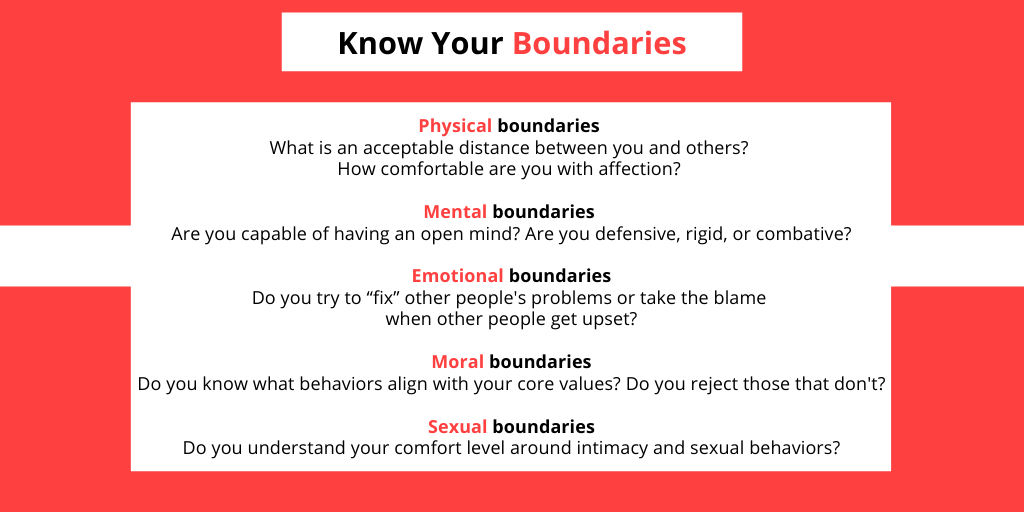 If the person does not hear your requests and continues to advance, try to distance yourself and, if necessary, enlist someone's support.
If the person does not hear your requests and continues to advance, try to distance yourself and, if necessary, enlist someone's support.
If you find yourself out of control because of pain or fear, continue to violate someone else's boundaries, or attract those who violate yours, try to learn effective communication skills. nine0003
I'm in the house: how to set boundaries
Personal boundaries are a line that runs between individuals, the people around them, and larger social systems. They are needed so that we can clearly feel: where I am, and where I am not; where are my own emotions, actions, beliefs and thoughts, and where are others. And if these emotions and thoughts are mine, then I am responsible for them and control them. Borders also protect our inner world from outside encroachment.
They may look like a five-meter stone fence with barbed wire and machine gunners on the towers. Or they may be absent altogether - all the doors will be wide open. Boundaries can change depending on the context and environment, become solid for some people and completely blurred for others. nine0003
Or they may be absent altogether - all the doors will be wide open. Boundaries can change depending on the context and environment, become solid for some people and completely blurred for others. nine0003
Personal boundaries can be opened for "import", when we gladly accept other people's help, resources, time, money, etc., or for "export" - our own resources. We usually import what we especially need, and we export either what we have in abundance, or what we hope to get a good price for.
Borders are needed to mark two important questions:
1. What do I consider my property (and, accordingly, I will protect)?
2. What am I responsible for (and will try to control)? nine0003
Boundary checking
How does this manifest itself in specific behavior? There are people for whom property boundaries can be very arbitrary.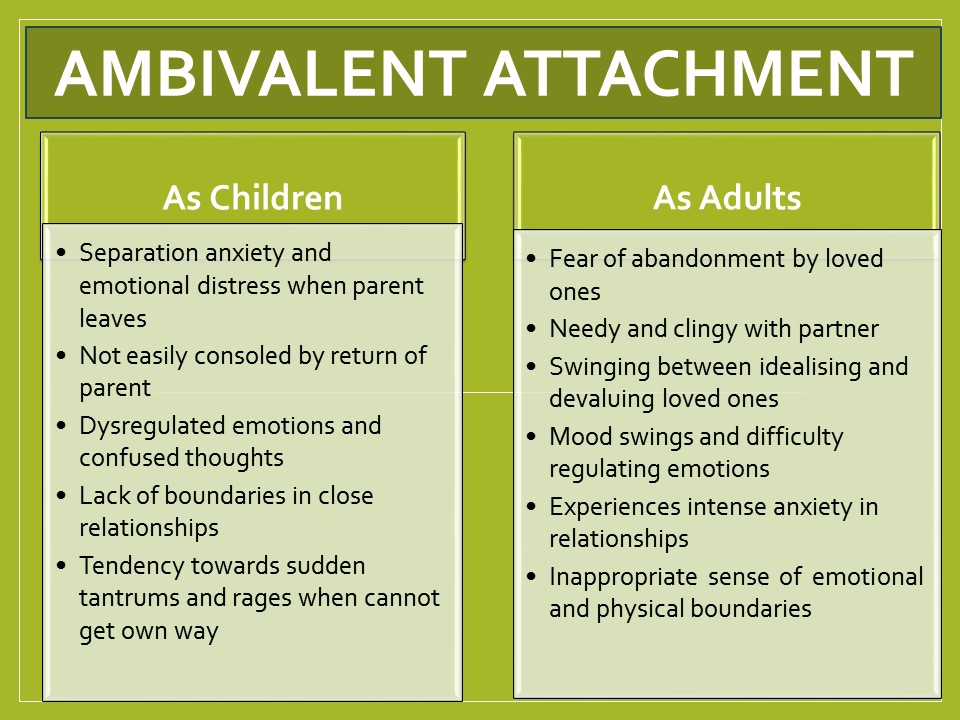 Such a person does not consider anything his own, inviolable, he "does not become attached to things." He cannot close himself in his room because he considers it impolite. Such people cannot refuse help or money, even realizing that this money will not come back. Their borders are always open for imports, it is important for them that people see them as kind, generous and open. It's a way to build relationships. Sometimes they even think that having nothing of their own is safer. nine0003
Such a person does not consider anything his own, inviolable, he "does not become attached to things." He cannot close himself in his room because he considers it impolite. Such people cannot refuse help or money, even realizing that this money will not come back. Their borders are always open for imports, it is important for them that people see them as kind, generous and open. It's a way to build relationships. Sometimes they even think that having nothing of their own is safer. nine0003
The opposite type is people whose boundaries are too wide. They consider everything their property - wife, children, employees, office or apartment space, other people's things and time. They do not see other people's boundaries and do not consider it necessary to observe them. Wherever such a person is, there is always “too much” of him, he captures the space around him. And if he was not given something in a good way, he can take it away "in a bad way.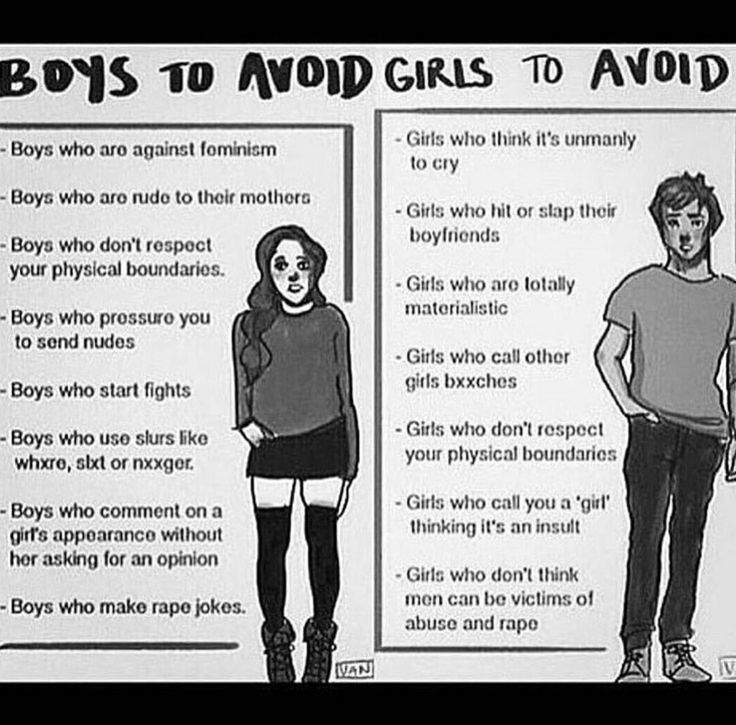 "
"
Two "extreme" types also exist in relation to responsibility. There are people who take on too much, trying to control what is beyond their control. Such a wife thinks that her husband yelled at her because she did not have time to set the table on time or did not clean up well enough. People agree with every charge brought against them. The logic is this: if I tried better (guessed other people's desires and did everything right), then this would magically change those around me, make them happy and loving. People with such a strategy of thinking lack recognition and praise, they are ready to do everything to get this simple currency. nine0003
The other extreme is characters who are not ready to take responsibility not only for others, but also for themselves. They do not see their contribution to the development of conflict situations, do not accept criticism and try to avoid any obligations.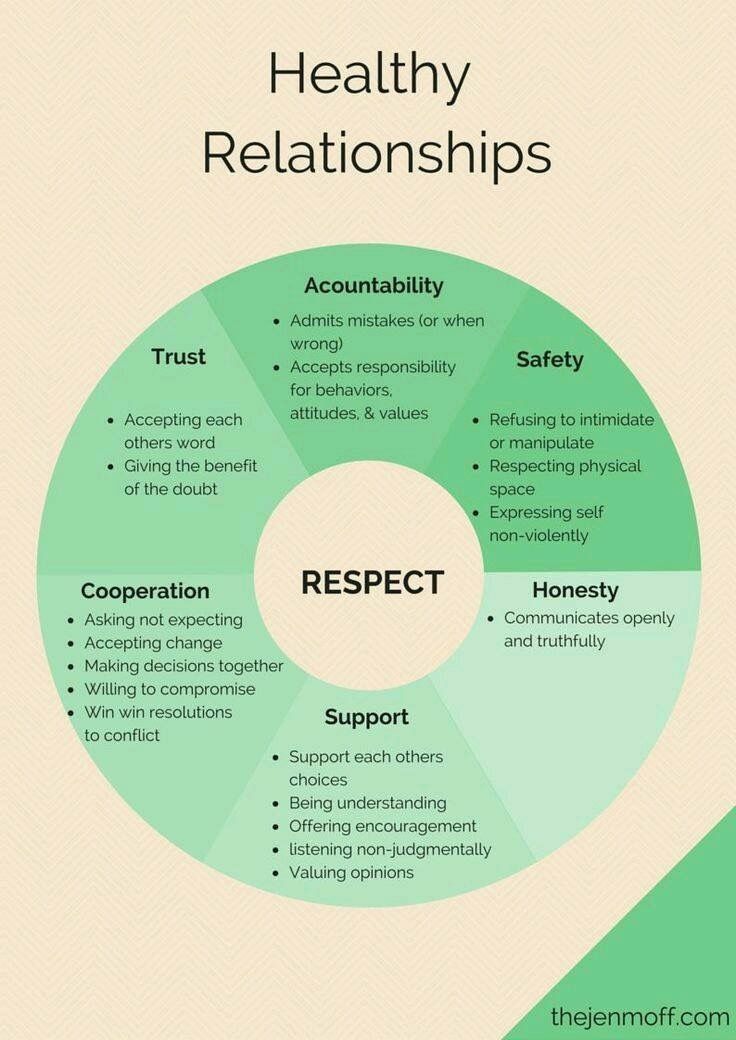 If you entrust them with a project, they will either require a partner or will come running every half hour with questions and clarifications so that the responsibility does not lie with them (or at least not with them alone). Men with a fear of responsibility are almost elusive for marital or paternal obligations. They consider them a violation of their boundaries, because the family will force them to change their usual way of life. nine0003
If you entrust them with a project, they will either require a partner or will come running every half hour with questions and clarifications so that the responsibility does not lie with them (or at least not with them alone). Men with a fear of responsibility are almost elusive for marital or paternal obligations. They consider them a violation of their boundaries, because the family will force them to change their usual way of life. nine0003
Border guard's day
How to define your borders and protect them? Unfortunately, you cannot put up pegs and notify others that “this half a meter of land around me is my territory, do not enter without knocking.” Although, in fact, this is exactly what young ladies with long puffy skirts did in the old days.
In my trainings I often do a simple exercise. I ask a person to designate a limit invisible to others, and I begin to slowly approach it - step by step. The task of the participant is to make it clear without words that I am already close to the point that I do not need to cross. The reaction is very different. Someone is very calm at first and only at the last moment begins to frown. Someone, on the contrary, from my first step “gets into a pose” and puts on “boxing gloves”. Very polite people let me close, with a bewildered smile on their face. And only then it turns out that I have long passed the intended border. There was also such an “intelligent” reaction: when a person understands that I am not going to stop and provoke him to more obvious actions, he himself takes a step back, leaving his integrity stable. But in order to stay at a safe distance from me, he has to give up his territory. nine0003
I ask a person to designate a limit invisible to others, and I begin to slowly approach it - step by step. The task of the participant is to make it clear without words that I am already close to the point that I do not need to cross. The reaction is very different. Someone is very calm at first and only at the last moment begins to frown. Someone, on the contrary, from my first step “gets into a pose” and puts on “boxing gloves”. Very polite people let me close, with a bewildered smile on their face. And only then it turns out that I have long passed the intended border. There was also such an “intelligent” reaction: when a person understands that I am not going to stop and provoke him to more obvious actions, he himself takes a step back, leaving his integrity stable. But in order to stay at a safe distance from me, he has to give up his territory. nine0003
I don't know how you would react in this exercise. Think about it.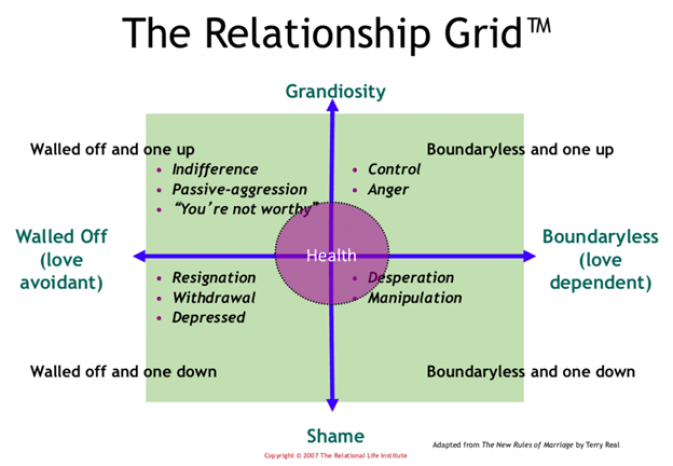
You can defend your borders in different ways in different situations. The ability to say "no" (without the subsequent sprinkling of ashes on the head!) Is an important personality skill. It is necessary for those who easily succumb to pressure, aggression and other "honest ways of taking money."
The ability to create and protect one's own boundaries, of course, is formed even by parents. But over the course of life (and with different people), boundaries can change many times. Teenagers, for example, protect them militantly, they need this life period in order to separate from their parents and learn to build their own lives on their own, to respect themselves. And couples in love sometimes completely dissolve in each other, and only then they begin to notice that it has become crowded. If you do not revise the rules of interaction in time, do not outline the circle of your interests, then the couple comes to a crisis or even breaks up.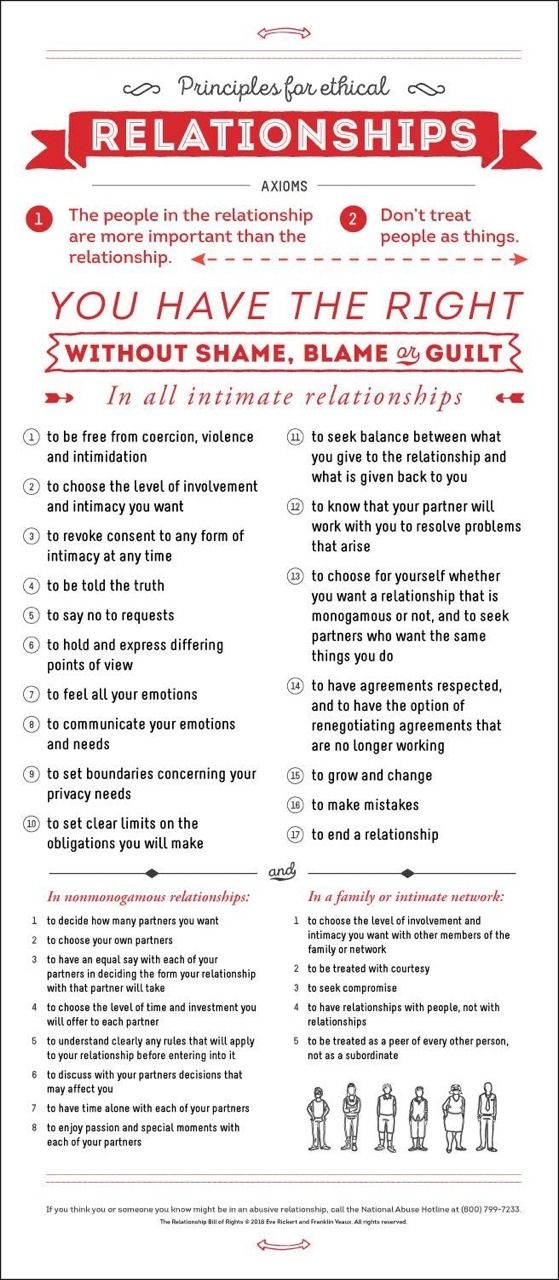 nine0003
nine0003
Like any other skill, the ability to see and respect one's own and others' boundaries may well be mastered at a later period of time.
How to defend your territory
How do you react to a yelling boss? Do you get nervous before public speaking? Are you able to refuse requests from loved ones if they are inconvenient for you? Do children have the right to disagree with you, to close in their room? How do you feel when your spouse (or best friend) said something “wrong”? Do you want to suggest, correct, give a cuff, shame, do you think that the actions of loved ones “dishonor your reputation”? nine0003
The skill of respecting other people's boundaries is, first of all, allowing other people to be different from you.